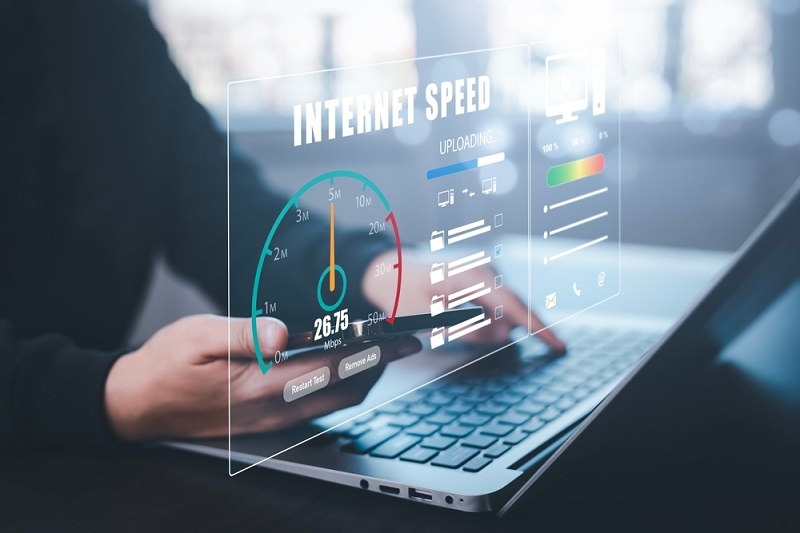
Just imagine a world where communication can happen instantaneously like almost at the speed of light with zero latency or signal degradation. A digital space where hacking is no longer a problem and information travels in qubits securely.
This is the power of quantum internet speed. A concept so transformative that it might redefine the very architecture of the internet that we know.
This blog will delve into the different elements and mysteries of quantum internet speed and explore how close we are to this breakthrough. You will also find out the key players who are investing in this revolutionary project and compare it with the current fiber infrastructure.
Traditional internet transmits data in binary that is in 0s and 1s, whereas Quantum internet uses quantum bits or qubits that can exist in multiple states simultaneously because of superposition. When paired with entanglement, it allows information to be shared instantly across vast distances with ultra-high security.
In theory, quantum internet speed isn’t measured just in megabits per second—it’s about transmission fidelity, entanglement rates, and quantum coherence across nodes. Quantum communication could eventually exceed the speed and security of today’s fastest fiber-optic lines.
What sets quantum internet apart isn’t just speed—it’s certainty. While traditional data streams can be intercepted and copied, quantum data cannot be read without being altered. This principle, derived from quantum mechanics, could herald the dawn of truly unhackable networks.
Top Read: Wi-Fi 7: The Future of Next-Gen Wireless Speeds
As of 2025, fiber-optic technology remains the global standard for high-speed connectivity. But is quantum fiber internet good enough to compete?
Fiber-optic internet is remarkably fast, with capabilities ranging up to 10 Gbps for residential and commercial use. Quantum internet doesn’t aim to replace this but instead complements it. Instead of transmitting classical data faster, quantum systems offer a new kind of communication—secure, low-latency, and resistant to attacks.
This is where quantum networks shine. Using Quantum Key Distribution (QKD), data is encoded in quantum states. Any interception attempt immediately disrupts the data, alerting both sender and receiver. Compared to traditional encryption, quantum offers an evolution in digital privacy.
Fiber relies on physical cables that span continents. Quantum networks may operate on existing fiber backbones but will eventually incorporate satellites, photon repeaters, and entanglement-based routers. Early versions of quantum fiber networks are already in use in China and Europe.
So, is quantum fiber internet good? It’s not only good—it’s necessary for the next wave of internet evolution. As quantum computing grows, traditional encryption won’t be secure enough. A quantum-secured network will become vital.

The question remains: When will quantum internet be available to the public? The answer lies in technological maturity, funding, and global cooperation.
China launches successful satellite-based QKD links. The U.S. and Europe create regional quantum testbeds for entanglement experiments.
The U.S. Department of Energy is building a small-scale quantum network connecting Argonne and Fermilab. Prototype systems emerge in academic and defence circles.
Pilot programs begin in select smart cities. Expect limited service for government and research entities in places like Tokyo, Boston, Zurich, and Singapore.
Quantum-secured connections will likely enter financial services, data centers, and secure cloud environments. Full consumer access may take another decade, but hybrid quantum-classical networks will be more widespread.
We may not have mass-market access to quantum internet by 2025, but we’re laying the tracks. The foundation is already forming beneath our feet.
Several quantum internet companies are accelerating this progress through hardware development, software platforms, and infrastructure innovation.
This company is working to build a fault-tolerant photonic quantum computer and supports underlying quantum networking technologies. Their work is fundamental to scaling quantum internet capabilities.
As part of Alibaba, Aliyun focuses on deploying secure quantum channels and entangled photon generation at scale.
QuTech is developing quantum network protocols and building real-world quantum repeaters. Their testbeds are already enabling early quantum communication trials.
A commercial leader in QKD and quantum-safe cryptographic hardware. Already been integrated into several secure government and banking systems.
Although best known for quantum computing, Xanadu’s work on photonic chips and quantum routers makes it vital to the future of quantum networking.
These quantum internet companies are shaping a market expected to exceed $9 billion in value by 2030.
Must Read: Why High-Speed Internet is Crucial for Business Success
As revolutionary as it is, the quantum internet is not immune to failure. So, what causes quantum internet outages?
Quantum states are fragile. Heat, noise, or time can degrade qubits, causing them to lose their state. This fragility threatens long-distance reliability.
Quantum information often travels via photons. If photons are absorbed or misaligned, data transmission fails. Developing quantum repeaters is crucial to solving this.
Currently, only a handful of locations support quantum networking infrastructure. Redundancy plans will require classical fiber backbones.
While these issues exist, advancements in cryogenic cooling, error correction, and entanglement purification are steadily closing the reliability gap.
In the near term, we can expect hybrid networks—where quantum layers secure traditional fiber-based internet. Financial institutions, defence sectors, and large enterprises are likely to be early adopters.
Eventually, dedicated quantum networks will serve as a parallel internet, handling tasks where speed, security, and privacy are paramount. Think encrypted communications, quantum cloud computing, and remote sensing.
A fully quantum internet may still be 15–20 years away for public use, but a quantum-enhanced fiber network could be widespread by the early 2030s.
The growing data globally has multiplied the cyber threats because of which quantum internet speed is becoming a necessity. It offers a rare convergence of speed and security that almost feels like science fiction becoming reality.
This transition is going to take a lot of time. Thus, companies can stay ahead of the competition by monitoring the progress and collaborating with quantum internet companies for pilot programs. The role of government is massive as well; they must build cooperation and prepare the required infrastructure.
Fiber remains the standard today but quantum internet is the destiny.
This content was created by AI